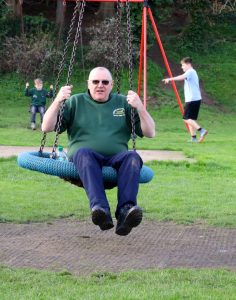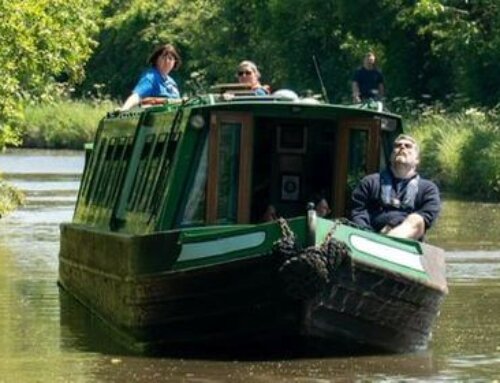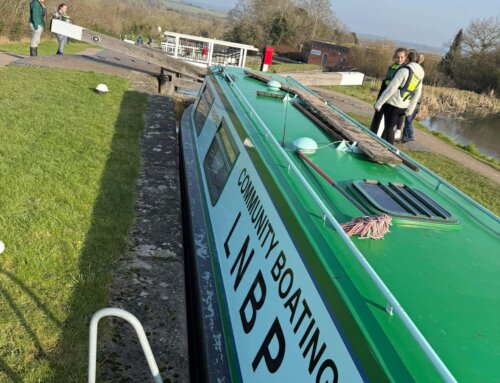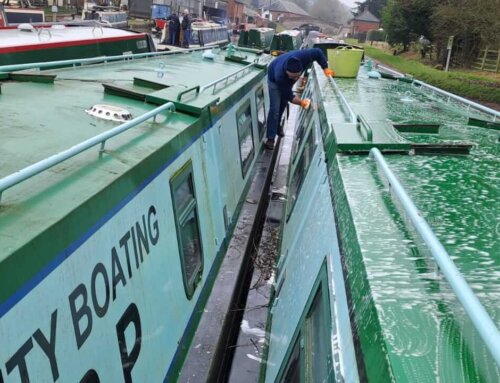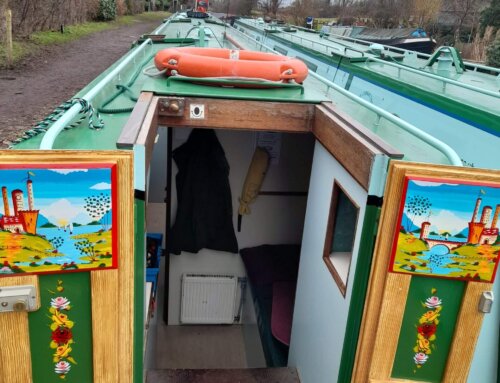Many things can gone through the mind of a LNBP Skipper during the course of a group booking, whether it is before, during or after the trip.
Here, LNBP’s Booking Officer and one of our Project Skippers, Nigel Smith, gives us an insight.
As the Booking Officer for LNBP, I often get to speak to group leaders many months in advance of their cruise with us. Another member of LNBP allocates the skippers to groups and if allocated a trip, I try to make early contact with the group informing them that this time I’m the skipper not the Booking Officer!
I always ask a group “What do you want out of the trip?” A strange question maybe and sometimes, particularly with new groups to LNBP, groups don’t know and I am asked for my comments based on my experience.
I take several matters into account. For example how old are the youngsters? Do you want a cruise with plenty or few locks?. From trips ranging from two to seven nights, I have a bank of about eight routes to offer. I work on the following guides: 2-3 mph and a lock will take 12-15 minutes. If actual times are quicker, then that’s a bonus.
Come to the day of the cruise, I try to get to the boat some three hours ahead of the scheduled departure time (sometimes some groups will arrive later due to travelling times). I will always try and ask groups to contact me about an hour before they arrive at Braunston as my aim is to have the kettle ready for a welcoming drink.
Briefings
When the group arrives, I introduce myself and then give the group some time to get onto the boat with all the luggage and food. After an hour or so, I will give my initial safety briefing about the boat (one of several briefings that I can give, other briefings would be lock safety, general outside safety and if the trip is in a certain direction, a briefing concerning tunnels). I always start my briefings by stating “My name is Nigel, my first drink of the day is tea, my second drink is coffee, a sweetener in either and that’s all you need to know about me!
I also give the unique meaning of what a quick two blast sounding of the boats horn means. As I say, it means that you look at the skipper on the back of the boat, I’ll make a gesture with my hands in the shape of a ‘C’ or ‘T’” the brighter youngsters soon guess that means Tea or Coffee!
Another important job is to get everyone allocated and fitted with a buoyancy aid. Tallest on my left, shortest on my right, that’s my first instruction, this as all the buoyancy aids are stored in size order and it makes fitting easier – I’ll come back to buoyancy aids later.
When it actually comes to moving the boat, we have agreed a set-off time (normally after breakfast of course!), I have a mental plan for my day and this is always fluid. I may have to change plans at any time in the day as things change. For example I encountered a problem that put us seven hours behind schedule in one day – I arrived at a lock flight of eleven locks and there was twelve boats in front of me. For all eleven locks, it was like that.
Steer the boat
One of the things I try to encourage is that the passengers have a go at steering the boat. My instructions as far as the tiller (that’s metal rod in the shape of a number 7 that steers the boat) is confined to three sentences.

- Pull it to you.
- Push it to me.
- Back to the middle.
For the more confident, I swap my side at the stern and allow access to the throttle reminding everyone that whilst we only travel at 3 mph, my boat weights twenty-five tons and I have no brakes!
Behave yourself
When it comes to behaviour, I will normally talk to the group leader. My view is that the group leader deals with behaviour, whereas my prime role is that everyone is safe. Standing over an engine, the noise makes it almost impossible to hear what I might have to say if you are at the other end of the boat. Going back to my football refereeing and policing days, my whistle never has been retired! The shrill of the police whistle soon gets attention, it is my sign to stop what you are doing.
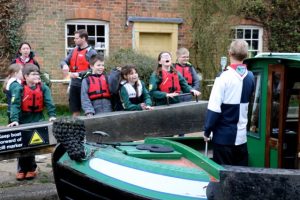

I differentiate a person may not be showing poor behaviour but may be acting in an unsafe way; the classic example being running around the lock area. The whistle is always followed with an explanation.
When it comes to food, LNBP always asks a group if the skipper could be included in the catering. It’s not that the skippers can’t cook, it just helps to sit down together and share and talk over a meal.
As the day comes to an end, I’ll talk with the leaders, which can be about the day just gone, what tomorrow is about, do you need more shopping? What time to you want to start? etc etc. I will try and plan certain parts of a cruise out to avoid situations. Having crewed a boat and climbed the twenty-one locks at Hatton in the midday sun in temperatures of 30 degrees plus, it is not something I would want others to do. Hatton Flight is a job for the morning or late afternoon in the summer!
Throughout the day, all doors are normally kept open to allow access from the front of the boat to the back or visa versa. Around nine o clock in the evening, as a skipper I’ll make my way perhaps to my own cabin (the only privilege I have!). Maybe the latest Gerald Seymour novel, maybe switch the radio from Test Match Special (I never skipper if there is a Test Match at Edgbaston!) to Radio5live or Classic FM. Sometimes it’s just an early night.
Out and About
For a five-day cruise or longer duration, a suggestion is made for a visit to an attraction at some nearby location – Warwick Castle and Drayton Manor Theme Park being two that spring to mind, but there are many more (just ask!)
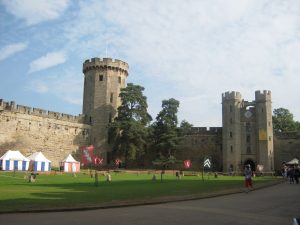
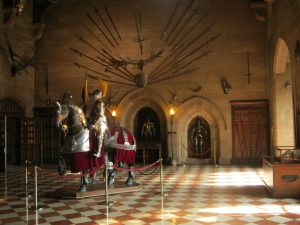
Living in The Midlands, such locations are familiar to me and therefore I tend to stay on the boat for the day, and if we have moored near to a water point I tend to have the luxury of a long hot shower knowing I can fill the boat with water again with relative ease. Also, this rest day as such is normally a chance for my wife and dog to come and spend a day with me.
Another normal feature of a rest day and certainly on the cruises of a week’s duration is that the toilets must be emptied. With two toilets and the pump out vacuum on a timer, the pressure is on to empty using maybe just one token!
Be it a weekend, week or maybe longer, I am always relieved when I have the boat back onto our mooring at Braunston; not glad that my guests are leaving me but simply back on time. Time lost on the canal can’t be made back by increasing speed, only by earlier starts later in the cruise. Once the boat is back on the mooring, a whole manner of things take shape from the cleaners coming on board, any mechanical issues checked, and toilets emptied (again). Sometimes there is only four hours to get all this done, especially in the busy periods.
So on your next trip with LNBP and you see the Skipper staring into space, perhaps you may now know what he’s thinking about.
LNBP are now taking bookings from community groups and organisations for weekend, short breaks and longer holidays in 2020 and 2021.
If you and your community group would like to to experience the beauty of the inland waterways of central England and find out more about life on a canal boat, why not get in touch to find out what we can offer, and check out dates and our current availability.
Please contact Nigel on 07967 406 875 or via email: bookings@lnbp.co.uk.

